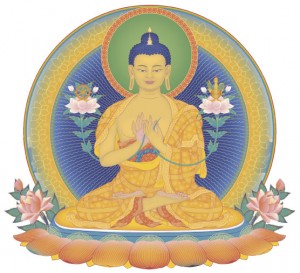Rebirth, reincarnation and past lives
The afterlife in Buddhism, Judaism and Celtic Christianity
| The belief in rebirth is not confined to Buddhism.
Before the publicity surrounding the controversial comments concerning the Holocaust by
Rabbi Ovadia Yosef, few Christians realised the importance of the concept of reincarnation
or rebirth in Judaism, where it is known as 'gilgul' or 'ibur'. This has
raised the question: 'If belief in rebirth occurs in Judaism, why was it not
carried forward into Christianity?' The Buddhist and Jewish beliefs are similar in that it is the very subtle, non-material mind which survives death. Since this is the only thing that we can take with us to the future, we need to make the best use of our present life to improve its state. The very subtle mind carries qualititative imprints rather than facts and figures, and its manifestations are intuitive. That's why the sense of deja vu - of absolute familiarity with a place or situation despite never having been there is this life - is usually experienced deeply and intuitively as qualia rather than as 'factual' remembrance. Even in life, the untrained mind is naturally uncontrolled and likely to flit from one object to another. After death this tendency is magnified in the intermediate afterlife state known as the bardo. In this condition the mind has little willpower to resist being drawn into whatever future lifeform and environment the karmic imprints from past lives predispose it to. This process is known as uncontrolled rebirth. One of the objectives of Buddhist meditation is to stabilise the mind and remove negative imprints in order to avoid the worst kind of uncontrolled rebirths (see Lamrim and Lojong practices). In the Christian tradition, there are a number of references to
past lives in the New Testament. It is likely that the early church, especially the
Celtic Christians, believed in gilgul. Unfortunately Celtic Christianity was suppressed by
the authoritarian continental church at the Synod of Whitby in 664, which confirmed the
triumph of religion over spirituality. Nevertheless, the idea of reincarnation
persisted in the Celtic lands of Western Britain for many centuries after (for example in
the teachings of the Irish philosopher Johannes Scotus Erigena
who taught that the ultimate destiny of all minds, animal and human, is to merge
into the blissful state of Enlightenment). Traces of early belief in rebirth can
still be found in Celtic folklore. However, the last vestiges of belief in past and
future lives were removed from Western European Christianity with the brutal extermination
of the Cathars (Albigensians) in the 13th century. In contrast, the Celtic Church had not passed through the stage of corruption by
political absolutism. Its teachings were much more authentic and in accordance with the
intentions of its Founder, with no trace of sadistic authoritarianism or negative soteriology. The similarities between
Buddhism and the Celtic Church are quite remarkable (See 'The Celtic Alternative - a
Reminder of the Christianity We Lost' by Shirley Toulson, publ Rider, London 1992, ISBN
0-7126-1478-8.) - Sean Robsville See also:
Christian versus Buddhist worldviews Introduction to Buddhism Arguments against
Buddhism
RATIONAL
BUDDHISM |
